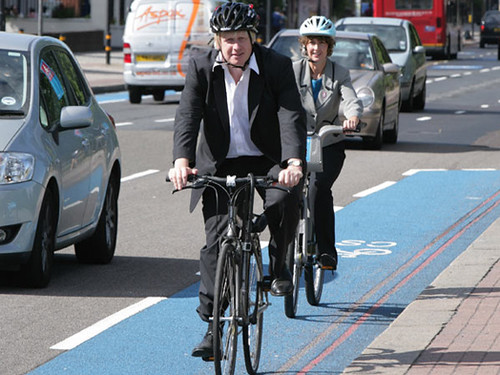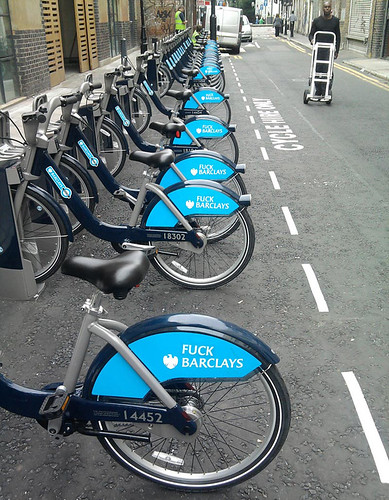The proposed bike sharing system in Baltimore will be funded by sponsorship and advertising sales. See "
Baltimore Takes Big Step Toward Implementing Bike-Share Program" from Citybizlist. And to get the New York City bikesharing system off the ground, the operator has to get $50 million in sponsorship. See "
New York May Become Newest Bike-Sharing Mecca" from NPR.
Not everyone likes sponsorship either and may object to the further commodification of the public space (I am resigned to it in some respects, and see the costs and benefits, at least in certain situations). See "
Boris Johnson's London Cycle Hire scheme flogs our birthright to Barclays" from the
Guardian about London Cycle Hire--the blue used to demark bike lanes is the same color that Barclays uses in their branding scheme.

London (original source unknown)

Montreal (
photo from Spacing Montreal)

Now, since I am part of the field in trying to do bike sharing (we sell this great system from Spain) you can take what I say with a grain of salt.
There ain't that kind of money out there. Not in Baltimore at least, unless you can get a foundation like Casey or Abell to pay for it. There just aren't that many large companies based there any more, with the exception of the local utility (which is supposed to merge into another company based elsewhere), Under Armour (a possibility actually), and a couple financial companies.
It's complicated by the fact that most cities have already signed contracts for bus shelters/street furniture with advertising companies that give the ad companies exclusive right to sell ads in the public space. So if you come up with bike sharing, and intend to have ad sales as part of the revenue stream, you can't, unless the contract was written to allow for such a use--and since most of these contracts pre-date bike sharing in the U.S., they aren't written that way.
In New York City, because it is the co-financial capital of the world, along with London, where Barclays Bank paid to be the prime sponsor of London Cycle Hire and the city's bike lanes (they call them "Cycle Superhighways" but what they are are blue painted bike lanes--they are not cycletracks or otherwise separated lanes, which is what a superhighway ought to be), might be able to get that kind of funder--alternatively, Mayor Bloomberg, who will need to get some positive pr given his pro-capital removal of the "Occupy Wall Street" encampment at Zucotti Park overnight (
Occupy Wall Street: New York police clear Zuccotti Park" from BBC News), might pay for it to get the positives, since he is likely to go into an even deeper fall on his approval ratings.
Barclays is paying about $8 million (U.S.) per year for five years. See "
Mayor's 'cheap' sponsorship deal for London cycle hire" from BBC News. While the system in DC is positive in terms of operating revenue, the London system is project to have $16 million annual losses.
The thing is, for a variety of reasons, U.S. banks and financial companies (see "Occupy Wall Street") have problems of their own and so, while they might want the positive pr associated with bicycling, they might not be able to withstand the scrutiny of such a deal ("you mean you won't return my calls about impending foreclosure, but you'll sponsor yuppie biking?!"), plus regulatory authorities might frown on the deal.
Note that in Chattanooga, my firm bid on the bike sharing program there. We didn't win--Alta did, and now they are opening a year after the contract said, which in my eyes is a material change in contract terms which should force a re-bidding--but we did get an expression of interest from a major Southeastern banking company for sponsorship. However, I did wonder if they would be able to go through with it, given these kinds of issues.
Labels: bicycle sharing, government contracting, infrastructure, public finance and spending, transportation planning






0 Comments:
Post a Comment
<< Home